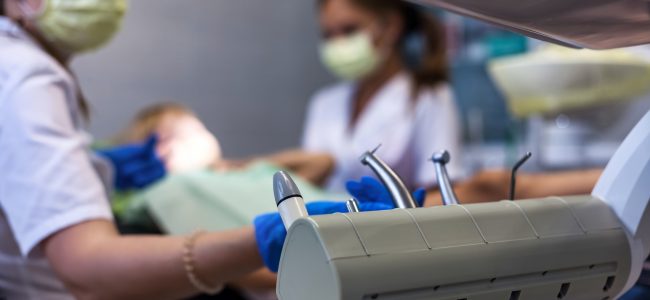BlogLine
Distinction between business practice and professional practice might support Consumer Fraud Act claim against dentist
12/12/23

By: Joshua W. Zhao and Donald Patrick Eckler
Do a dental clinic’s business practices fall under the Consumer Fraud and Deceptive Business Practices Act (Consumer Fraud Act), 815 ILCS 505/1 et seq. even if the practice of dentistry does not? In Mathis v. Yildiz, 2023 IL App (1st) 221703, the Illinois Appellate Court held, in line with the law of other states described below, that the answer is yes if the plaintiff can plead conduct against the dentist related to his business practices that is separate from his professional work. This ruling suggests that similar claims regarding business practices could be brought against other professionals.
In November 2018, Plaintiff Shanton Mathis visited her dentist, Dr. Yildiz and complained of a filling that another dentist had installed earlier that year. Dr. Yildiz recommended that Mathis receive a replacement filling despite knowing that Mathis, who was on Medicaid, would be unable to have the procedure covered by insurance. In January 2019, Dr. Yildiz allegedly and falsely told Mathis that she was going to place a filling and that Mathis’ insurance would cover it. Instead, the plaintiff alleges that Dr. Yildiz used a drill to damage the tooth so the repairs to the tooth might qualify for insurance coverage. Dr. Yildiz then is alleged to have required Mathis to sign a treatment plan that mandated that Mathis pay $600 out-of-pocket to complete the dental work if it was not covered by insurance. Destiny Dental, Dr. Yildiz’s employer, is then alleged to have submitted the post-drilling X-rays to Mathis’ insurer. Mathis claims to have suffered pain for several months until she paid another dentist to repair the damage.
Mathis filed suit against Dr. Yildiz and Destiny Dental as Dr. Yildiz’s employer, alleging violations of the Consumer Fraud Act through “balance billing” as Mathis alleged that Dr. Yildiz was prohibited from “balance billing” a Medicaid recipient. Mathis also alleged that Dr. Yildiz drilled without a legitimate medical purpose so she could defraud Mathis’ insurance. The trial court dismissed Mathis’ complaint as her claim involved dentistry services and she could not recover under the Consumer Fraud Act.
Mathis amended her complaint realleging the counts from her original complaint and adding a new count alleging that the treatment plan violated the Consumer Fraud Act because Dr. Yildiz knew that the treatment plan violated the agreement between Mathis and her insurer. The trial court dismissed Mathis’ amended complaint stating that dentistry does not constitute trade or commerce and does not fall under the Consumer Fraud Act. The court entered judgment against Mathis and she appealed.
On appeal, the appellate court held even if the Consumer Fraud Act does not apply to the practice of dentistry, it applies to the business aspects of the dental industry. The appellate court held that excluding the dental industry from the Consumer Fraud Act is contrary to the will of the legislature and the wording of the statute. The appellate court questioned whether the Consumer Fraud Act should exclude claims of dental malpractice but did not hold that the Consumer Fraud Act covers dental malpractice. The court held that charging and collecting out-of-pocket payments from patients is covered by the Consumer Fraud Act, which is alleged to be independent of the practice of dentistry, as it is not part of the practice of dentistry. The appellate court remanded the case with instructions that Mathis be allowed to amend her complaint so her malpractice claims could be separated from her billing claims. The court held that the allegation that Dr. Yildiz defrauded Mathis’ insurance was properly dismissed as Mathis could not recover under the Consumer Fraud Act.
The appellate court’s holding of the distinction between commercial services from professional services is like those of other states. Maryland’s Consumer Protection Act exempts professional services. Hogan v. Maryland State Dental Ass’n, 155 Md. App. 556, 564 (2004). However, medical billing is not considered a professional service. Scull v. Groover, Christie & Merritt, P.C., 435 Md. 112, 126-30 (2013). Hawaii does not exempt legal services from its consumer protection statute if it involved “trade or commerce.” Goran Pleho, LLC v. Lacy, 144 Hawai’i 224, 245-51 (2019). In Washington, the Consumer Protection Act covers the commercial aspects of professional services, but not the services themselves. Michael v. Mosquera-Lacy, 165 Wash. 2d 595, 602-03 (2009). Other states with similar holdings include Connecticut (Haynes v. Yale-New Haven Hospital, 243 Conn. 17, 38 (1997)), Michigan (Nelson v. Ho, 222 Mich. App. 74, 83 (1997)), and Kentucky (Barnett v. Mercy Health Partners–Lourdes, Inc., 233 S.W.3d 723, 729–30 (Ky. Ct. App. 2007).
For more information, please contact Josh Zhao at josh.zhao@fmglaw.com, Donald Patrick Eckler at patrick.eckler@fmglaw.com, or your local FMG attorney.
Share
Save Print